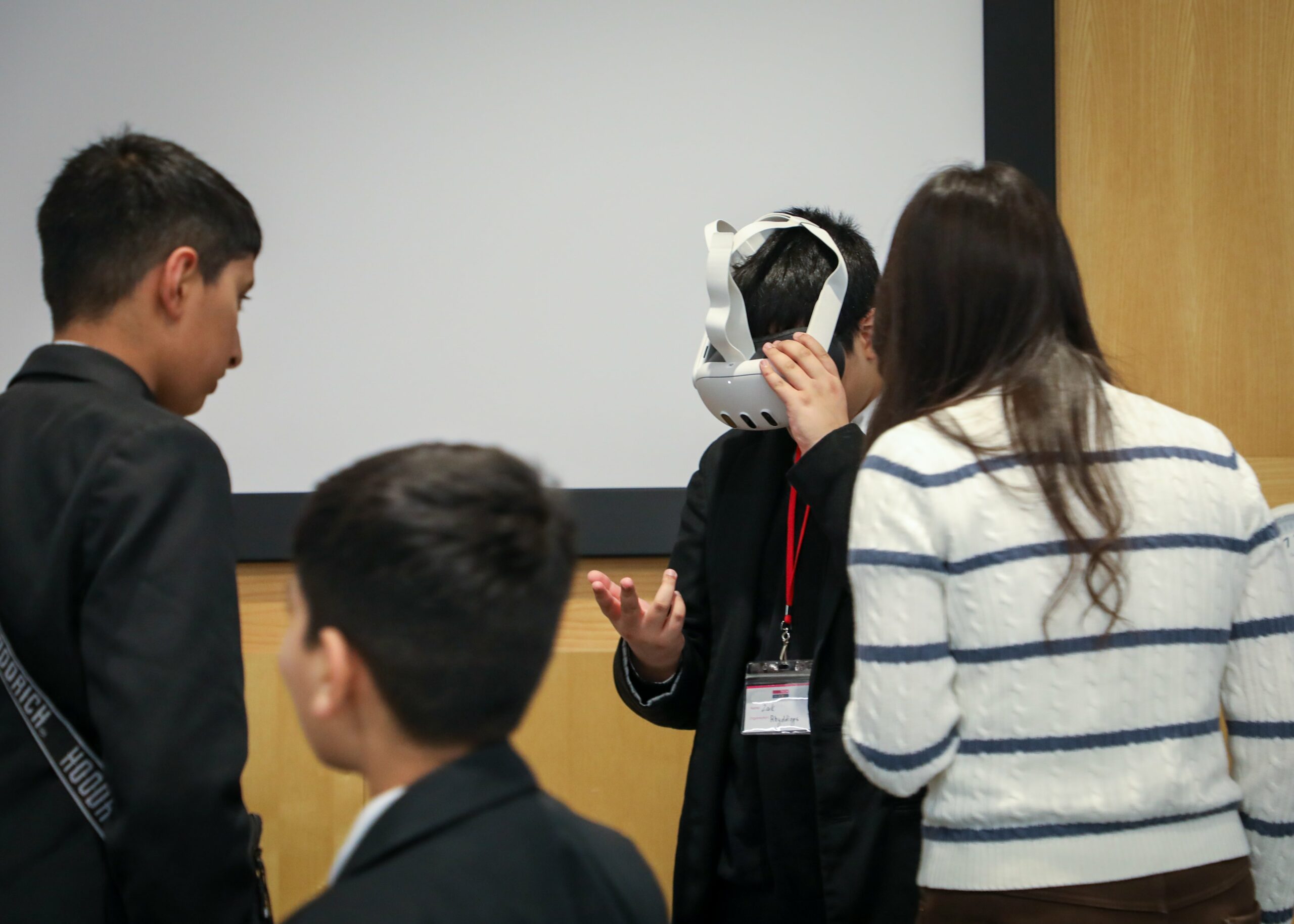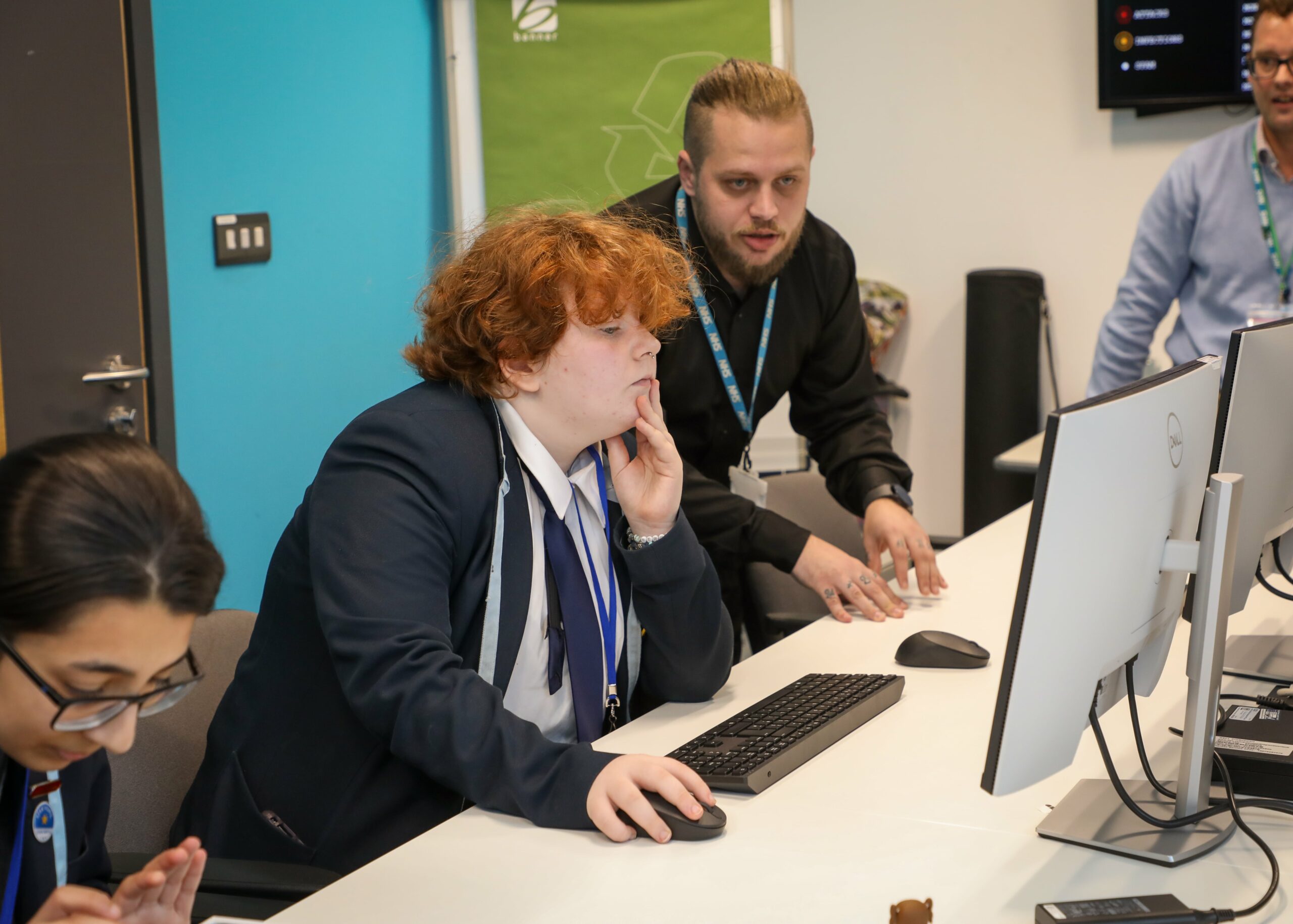On Monday, 25th November the Health Academy were proud to host the Teen Tech NHS Challenge 2024, bringing together students to explore the vital role technology plays in healthcare, offering a unique opportunity to innovate and create solutions that could shape the future of patient care.
Pupils from local schools were invited to the event, which featured insights from industry leaders, encouraging students to analyse the role of technology in their lives and consider careers in health tech.
Maggie Philbin, who opened the event, emphasized the growing importance of cybersecurity in healthcare, highlighting that while it’s easy to become an accountant, there are fewer clear pathways into the cybersecurity field.
Neil Pease, the Trust’s Chief People Officer, shared his personal journey from domestic roles to executive positions, discussing career progression within the NHS. He revealed that there are 140 different careers in the NHS, many of which are dependent on technology. He also shared a fascinating story about a software update that brought down the pathology database at Nottingham Hospital, showing the critical need for tech professionals in healthcare.
Students were encouraged to explore how health technology impacts their own lives. Gemma McCarthy from Amazon Web Services (AWS) demonstrated how AWS is transforming healthcare services, from facilitating online doctor appointments to reducing genetic testing times from months to hours. She also highlighted NHS services powered by AWS, including patient records and pharmacist diagnoses.
Saeed Umar, from the NHS tech team, explained the growing importance of digital and tech teams in areas like medical engineering and data science, emphasising the vital role technology plays in improving patient safety. He also shared some alarming patient safety statistics that could be significantly reduced by the use of technology, revealing that medical errors cause more deaths annually than diseases like breast cancer and AIDS.
Several experts shared their experiences to inspire the next generation of healthcare professionals.
Cat Lamoon, the Trust’s Senior Clinical Photographer, spoke about her work both at LTHTr and at other hospitals, including photographing a ground-breaking 8-hour operation to separate conjoined twins.
Kelly Cassidy, Medical Graphic Artist within the Blended Learning Team, discussed how she combines art and science to help explain complex medical procedures. Whilst Xinlin Chen, Content Developer within the department, shared her work on XR content development, using virtual and augmented reality to enhance medical education and patient care. Meanwhile, Quin Ashcroft, Senior Data Analyst within One LSC, emphasised the growing importance of data science in healthcare, both in patient care and corporate services.
Following the talks, the students then got to experience health technology first hand, including electronically powered prosthetic limbs, which connect via bluetooth. AWS Healthscribe, online software which enables the remote access of patient records between practices, Party Rock, an AI platform which can generate information, whilst also testing the Blended Learning Department’s extensive technology range, including VR Headsets, 3D Printing and much more.
The event also showcased student innovations designed to improve healthcare services. Given a hypothetical scenario, the students were encouraged to re-envision the future of healthcare, exploring how technology could be used to improve patient safety and medical education. They then had the opportunities to present their ideas at the end of the day.
Notable ideas included AI-powered triage apps that help reduce A&E waiting times by analysing secondary data and using voice recognition and imaging to assess appointment urgency. Other ideas included mood-regulating glasses that adjust to a patient’s emotional state and connect to therapists or doctors for assessment and brain scanner headsets designed for early intervention in brain injuries, identified as being particularly useful for military personnel in the field. Other inventions included a bracelet or necklace to monitor heart rate and remind patients to take their medication, supporting independence and reducing the risk of double-dosing.
Several awards were presented for the most innovative ideas.
The Best Teamwork award went to IPAXR from Riddings, Most Fun Ideas went to Life Plus from Hindburn Academy, Best Use of AI was awarded to Fulwood Academy, Best Use of Personal Experience went to Bedsore Soother from ATS, Best Use of Design was given to Mood-Regulating Glasses from Hindburn Academy, and Best Use of Data was awarded to Tech to Cut Food Waste from Darwin Aldridge Enterprise Studio.
The event culminated with a heartfelt message from Sharon Robson, Managing Director at One LSC. Sharon expressed her admiration for the students’ presentations, praising their creativity and problem-solving skills. She urged the students to continue pursuing careers in technology, emphasising that the healthcare sector desperately needs their innovative solutions.
She said: ‘Never stop trying to improve things, if you don’t have the tools to fix things reach out to the people who do. I have been blown away by the presentations and ideas you have all delivered. I could not have spoken to a group at your age. Listening to your ideas have been incredible. The problems you have outlined are real problems and we need your help. This si why we would like to encourage you to take up a career in technology.’
The Teen Tech NHS Challenge 2024 highlighted the transformative power of technology in healthcare and encouraged students to explore the diverse opportunities in this rapidly evolving field. With their innovative ideas and passion for improvement, these young minds are paving the way for the future of healthcare technology.

